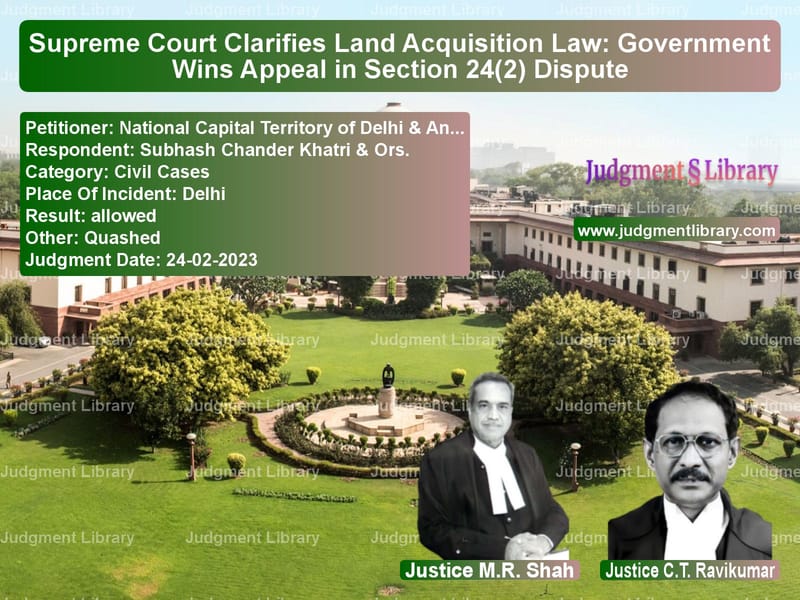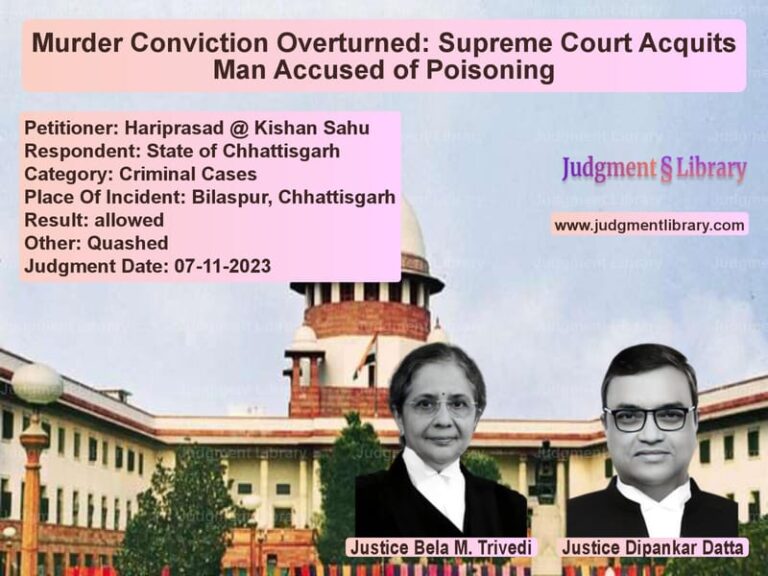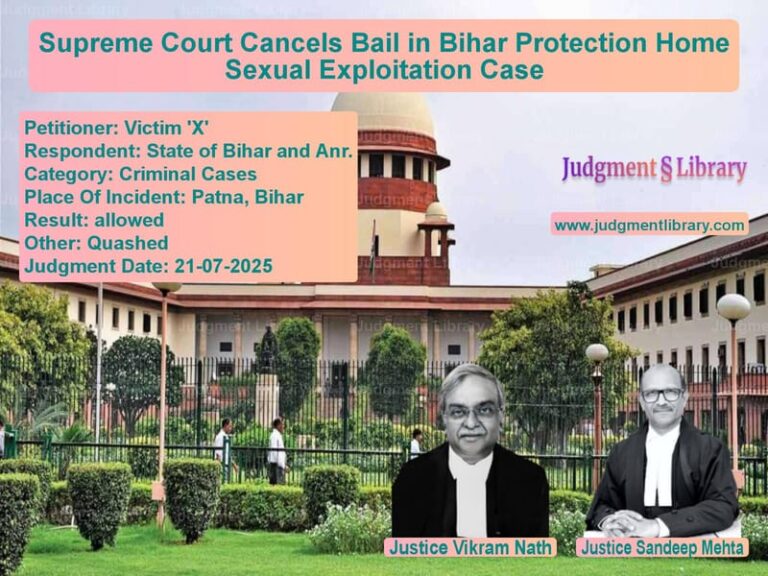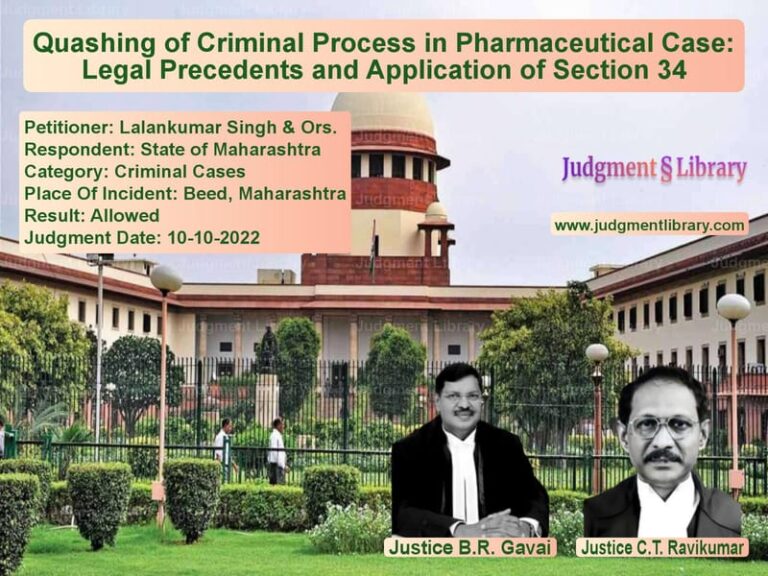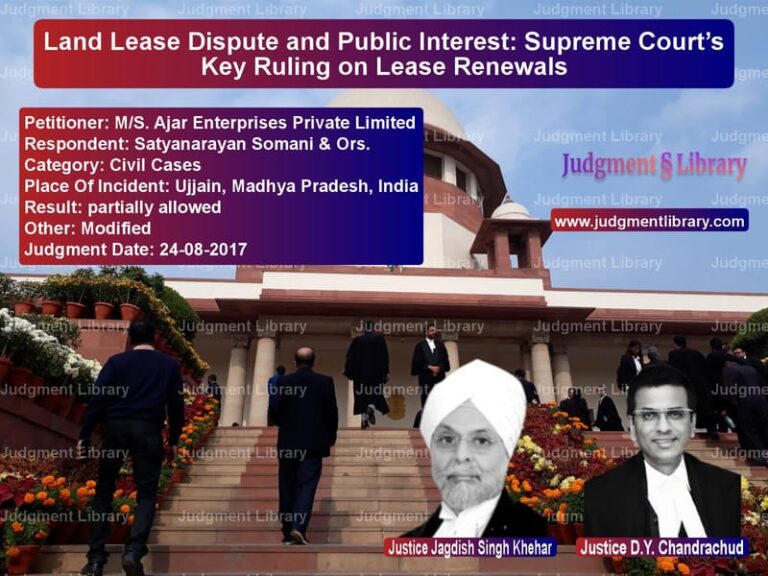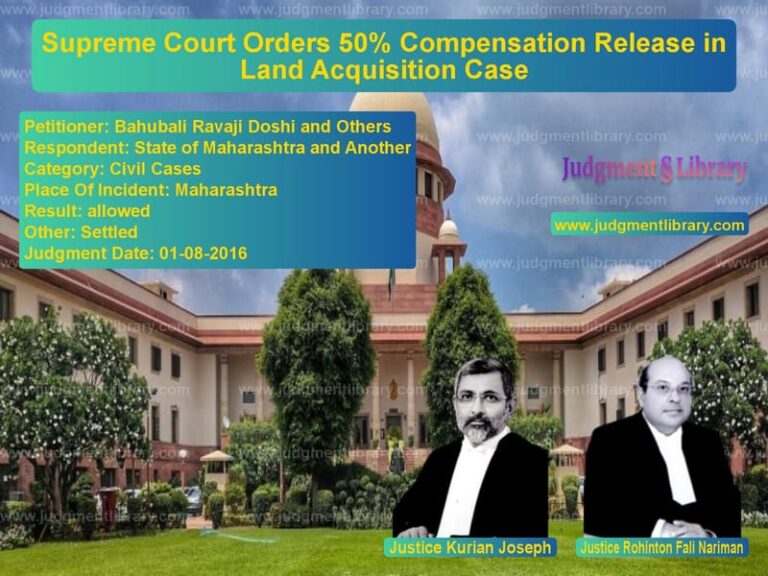Supreme Court Clarifies Land Acquisition Law: Government Wins Appeal in Section 24(2) Dispute
The Supreme Court of India, in National Capital Territory of Delhi & Anr. vs. Subhash Chander Khatri & Ors., delivered a significant judgment clarifying the applicability of Section 24(2) of the Right to Fair Compensation and Transparency in Land Acquisition, Rehabilitation, and Resettlement Act, 2013. This case revolved around a dispute where landowners claimed that the acquisition process had lapsed due to non-payment of compensation. The Supreme Court overturned the Delhi High Court’s decision, ruling that the acquisition was valid since possession had been taken.
Background of the Case
The case arose from the land acquisition proceedings initiated by the Government of NCT of Delhi for the construction of the Bankner Link Drain. The acquisition was conducted under the provisions of the Land Acquisition Act, 1894, and the government claimed to have taken possession of the land.
The respondents, Subhash Chander Khatri & Ors., filed a writ petition in the Delhi High Court, arguing that the acquisition had lapsed since compensation had not been paid to them. The High Court ruled in their favor, leading to the appeal before the Supreme Court.
Key Issues Before the Supreme Court
The primary legal questions before the Supreme Court were:
- Whether land acquisition lapses under Section 24(2) of the 2013 Act if compensation has not been paid, even when possession has been taken.
- Whether the Delhi High Court erred in applying an overruled precedent.
- Whether deposit of compensation in the government treasury fulfills the statutory requirement.
Arguments by the Appellant (Government of NCT of Delhi)
The government, represented by senior counsel, argued:
“The High Court erred in declaring the acquisition lapsed merely because compensation was not paid directly to the landowners, despite possession having been taken and the land being utilized for a public project.”
Their key points included:
- Physical possession of the land was taken, and the project was already underway.
- The Pune Municipal Corporation vs. Harakchand Misirimal Solanki (2014) judgment, relied upon by the High Court, had been overruled in Indore Development Authority vs. Manoharlal (2020).
- The deposit of compensation in the treasury satisfies the legal requirement and does not require direct disbursal to landowners.
Arguments by the Respondents (Subhash Chander Khatri & Ors.)
The landowners, represented by their counsel, countered:
“If compensation is not paid directly to the landowners, the acquisition process should be deemed lapsed under Section 24(2) of the 2013 Act.”
Their key arguments were:
- The acquisition process was incomplete as they had not received compensation.
- The authorities should not be allowed to take land without fulfilling payment obligations.
- The petitioners were entitled to fresh compensation under the 2013 Act.
Supreme Court’s Analysis and Observations
The Supreme Court referred to its Constitution Bench ruling in Indore Development Authority vs. Manoharlal (2020), which established:
“The deemed lapse of land acquisition under Section 24(2) occurs only when both possession has not been taken and compensation has not been paid.”
Key findings of the Court:
- Possession of the land had been taken and was already being used for public purposes.
- Non-payment of compensation does not automatically lead to lapse if possession has been taken.
- The deposit of compensation in the treasury is legally sufficient and satisfies the legal requirement.
The Court ruled that the High Court’s decision contradicted established legal precedents and failed to apply the correct interpretation of Section 24(2).
Final Judgment
The Supreme Court ruled:
- The Delhi High Court’s decision was quashed.
- The land acquisition did not lapse under Section 24(2) of the 2013 Act.
- The appeal by the Government of NCT of Delhi was allowed, restoring the validity of the acquisition.
- The respondents were not entitled to claim fresh compensation.
Implications of the Judgment
The ruling clarifies key aspects of land acquisition law:
- Possession Matters: If possession is taken, acquisition remains valid even if compensation is delayed.
- Binding Precedents Must Be Followed: The High Court should have applied Indore Development Authority (2020).
- Prevention of Misuse of Section 24(2): The ruling prevents landowners from using technical loopholes to invalidate government projects.
Conclusion
The Supreme Court’s ruling in National Capital Territory of Delhi & Anr. vs. Subhash Chander Khatri & Ors. sets a significant precedent in land acquisition disputes. By overturning the High Court’s ruling, the judgment ensures that technical loopholes are not exploited to delay government projects and that landowners do not misuse the law to claim undue compensation.
Petitioner Name: National Capital Territory of Delhi & Anr..Respondent Name: Subhash Chander Khatri & Ors..Judgment By: Justice M.R. Shah, Justice C.T. Ravikumar.Place Of Incident: Delhi.Judgment Date: 24-02-2023.
Don’t miss out on the full details! Download the complete judgment in PDF format below and gain valuable insights instantly!
Download Judgment: national-capital-ter-vs-subhash-chander-khat-supreme-court-of-india-judgment-dated-24-02-2023.pdf
Directly Download Judgment: Directly download this Judgment
See all petitions in Property Disputes
See all petitions in Public Interest Litigation
See all petitions in Contract Disputes
See all petitions in Judgment by Mukeshkumar Rasikbhai Shah
See all petitions in Judgment by C.T. Ravikumar
See all petitions in allowed
See all petitions in Quashed
See all petitions in supreme court of India judgments February 2023
See all petitions in 2023 judgments
See all posts in Civil Cases Category
See all allowed petitions in Civil Cases Category
See all Dismissed petitions in Civil Cases Category
See all partially allowed petitions in Civil Cases Category

